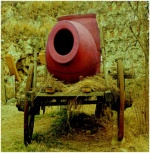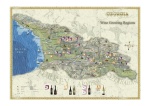The Wine Society’s connection to Georgia was established last year through the participation of College member (now member of Georgian Parliament) Giorgi Kandelaki. This connection has continued this year with the participation of George Tkhelidze, who hosted an outstanding introduction (with able assistance from Dianne Boodoo) to Georgia’s ancient and continuing vinicultural traditions. The favourite wines of the evening were Tbilvino’s 2003 Saperavi Special Reserve and Telavi Wine Cellar’s 2006 Icewine.
Introduction to Georgian Wine
Georgia, one of the most ancient countries in the world, is situated at the crossroads of Europe and Asia. About the size of Switzerland, with a population of about 4.5 million people, it occupies 69,700 sq. km between the Black and Caspian Seas. The national language, Georgian, is over 2,000 years old, and has its own alphabet.
Archaeological research provides evidence that Georgia is a – if not the – birthplace of wine. Grape seeds, specific trimming knives, ornaments with vine depictions and other objects were discovered in ancient burial places thought to be 4000 years old. Indeed the word “wine” has been traced to the Georgian word g’vino, which has been in use far longer than most modern languages have existed.
For thousands of years grapes have been placed in large, earthenware vessels called Qvevri (see below image). Buried in the ground up to their necks and kept in wine vaults called ‘marani’, these are then sealed and left for three to four months. This technique has a long tradition and is still being used today. The product is a wine rich in tannins and vitamins.
Georgia’s moderate climate and moist air, influenced by the Black Sea, provides excellent conditions for wine culturing. The main wine-making regions are Kakheti, Racha-Lechkhumi and Imereti.
About 500 aboriginal grape varieties are known in Georgia. From them, 29 wine varieties and 9 table grape varieties are included in the legally established standard assortment of grape varieties, covering 62 denominations. At this event we will taste some of the most interesting and exotic wines from different regions of Georgia: Tsinandali, Mukuzani, Kindzmarauli, Kvanchkara, Tvishi…
1. Kondoli 2005 (Telavi Wine Cellar)
Dry white wine: 80% Rkatsiteli / 20% Mtsvane. £7.92 (N/A in UK)
Origin: Kondoly vineyards, grown in medium clay soil with stony areas.
Host’s notes: This white wine is a result of careful selection of Rkatsiteli and Mtsvane grapes in Kondoli vineyards and oak barrel maturation.
Food pairing: Salads, grilled fish, cheese, poultry. Paired on the evening with Mchadi and Pkhali (Georgian corn flour bread and beetroot with walnut)
Comments from the tasting: Mtsvane means green in Georgian. True to form, the wine was a very pale green. Pleasant sweet nose – apricots and kiwi fruit. Palate – like an unwooded chardonnay? Weak taste – ultimately disappointing. We also tried a bonus wine – a wine from Teliani Valley with the same proportion of Rkatsiteli and Mtsvane. This wine was similar in appearance. Not as fruity on the nose – sweet but not in a fruity way (suggestions included mint, whiteboard markers). Palate – much fuller and drier. Overall a better wine than the Telavi.
2. Tvishi 2005 (Teliani Valley)
Medium-sweet white wine: 100% Tsolikouri, £9.35 (http://www.evingtons-wines.co.uk).
Origin: Racha-Lechkhumi, North, grown in sandy soil with stones.
Host’s notes: Appellation controlled wine Tvishi is made of grapes that are delicately picked and carried in boxes to the winery. After soft de-stemming, the grapes are gently pressed in a pneumatic press. Only the free-run juice has been used for further fermentation. Fermentation takes place in stainless steel tanks at controlled temperatures. When the fermenting juice reaches optimum sugar/acidity balance, fermentation is stopped by cooling, in order to retain the natural sweetness and freshness of the wine.
Food pairing: Aperitif, nuts, fruits. Paired on the evening with Mchadi and Pkhali (Georgian corn flour bread and spinach with walnut).
Comments from the tasting: Appearance: stronger yellow. Nose: sour worms candy – sweet yet with a sourish tinge. Palate – very enjoyable; reminds one of a semi-dry Riesling, sweet but with good acid balance. Would be good with sweet and sour pork?
3. Saperavi 2003 Special Reserve (Tbilvino)
Dry red wine: 100% Saperavi, £16.03 (http://www.turtonwines.co.uk).
Origin: Gurjaani region, grown in medium clay soil with stony areas.
Host’s notes: Made from high-quality Saperavi grapes picked at different micro-zones of the Gurjaani region. The squeezed juice is transferred to the oak barrels during the last phase of fermentation. The wine undergoes light filtration only, and in result becomes full-bodied and velvety, with tannin and excellent aging potential. Saperavi is aged for 12 months in oak.
Food pairing: Grilled meat, stews, cheese.
Awards: International Wines & Spirits Competition, London, 2006 – Silver “Best in Class” Medal; International Wines & Spirits Competition, London, 2007 and 2008 – Bronze Medal.
Comments from the tasting: Appearance – opaque crimson red, considerable sediment. Nose – chocolate/ coffee, smoky, dark fruits (plum), slight farm smells. Palate – wholesome and natural taste. Earthy/clay on nose and palate – reflects soil? Strong tannins – cabernet-like. Overall, an outstanding wine – the best Georgian wine MS has tasted. Excellent structure – good mid and back palate – avoids the lack of longevity that is a common characteristic of saperavi.
4.Mukuzani 2004 (Telavi Wine Cellar)
Dry red wine: 100% Saperavi, £8.88 (http://www.turtonwines.co.uk).
Origin: Mukuzani appellation, Kakheti, East Georgia, grown in medium clay soil with stony areas.
Host’s notes: Grapes are hand-picked at the optimum of their maturity. Soft de-stemming and crushing. Maceration on skins takes place for 2 days. Fermentation in stainless steel tanks at a controlled temperature (25-28 degrees C) is complemented by 8 months’ aging in oak barrels and further aging in-bottle at the optimum temperature.
Food pairing: Grilled meat, stews, cheese.
Comments from the tasting: Mukuzani is a village renowned for its saperavi. Appearance – not as opaque as (3), but slightly more purple? Nose – oranges, sangria. Palate – beautiful smooth taste, strong tannins, but well balanced – very drinkable. Lacks a little at the end. Better than (5), but not as good as (3).
5. Saperavi Satrapezo 2004 (Telavi Wine Cellar)
Dry red wine: 100% Saperavi, £10.17 (http://www.turtonwines.co.uk).
Origin: Telavi, Kakheti, East Georgia. grown in medium clay soil with stony areas.
Host’s notes: A marriage of tradition and modernity. Hand-picked Saperavi grapes from old vines are lightly crushed then fermented in traditional clay amphoras (called “Qvevri” in Georgian), buried underground. Traditionally, saperavi is fermented in this manner for the whole duration. The modern innovation in this case is that, after the first fermentation is complete, the young wine goes into French oak barrels to complete its malolactic fermentation and then mature. This Satrapezo-Saperavi wine has a great ageing potential and will improve for decades.
Food pairing: Grilled meat, stews, cheese
Comments from the tasting: Appearance – as in (3). Nose – straightforward dark fruits, pepper. Palate – very full-bodied, strong tannins, wet, musty. Perhaps these features are derived from the clay fermentation? Otherwise, it is hard to detect any influence of the clay. A strong punch, but fades away a little. Would benefit from ageing perhaps?
6. Gviani 2006 (Telavi Wine Cellar)
Semi-sweet white wine: 100% Rkatsiteli, £11.67 (N/A in UK)
Origin: Right bank of Alazani river, Kakheti region, grown in medium clay soil with stony areas.
Host’s notes: In late autumn, mature Rkatsiteli grapes, sustained on the sun, become sun-drenched and also partially affected by noble rot. They are meticulously selected, pressed, fermented and then matured in French oak barrels for 9 months. The first Georgian late vintage wine was crafted from TWC owned vineyards.
Food pairing: Best served cold as an aperitif or digestive, with cheese or desert.
Comments from the tasting: Nose – honey, marzipan/almonds. A minority of one ventured porcini mushrooms in olive oil! Palate – apricots, only medium sweet, not a true dessert wine. Wouldn’t stand up to a really sweet dessert – could be good with pineapple? An interesting characteristic – first half and last quarter are mostly sweet, but in third quarter there is a sour (lemon?) twist. Interesting.
7. Icewine 2006 (Telavi Wine Cellar)
Icewine: 100% frozen Rkatsiteli, £13.33 (N/A in UK)
Origin: Kakheti Region, grown in sandy soil with stones
Host’s notes: This is the first Georgian Icewine. In early winter, when temperatures fall below -9 degrees C, completely frozen Rkatsiteli grape berries are carefully picked and immediately pressed. Only the free run juice is clarified and then fermented for two months.
Food pairing: Should be served very cold. Can be paired with fruit and sweets, or would be enjoyed on its own as an aperitif.
Awards: International Wines & Spirits Competition, London, 2008 – Silver Medal; Decanter World Wine Awards 2008 – Silver Medal.
Comments form the tasting: Nose – apricot jam, very ripe mango. Palate – delicious, beautiful. Great structure and good sugar/acid balance. A triumph.
8. Khvanchkara 2007 (Telavi Wine Cellar)
Medium-sweet red wine: 50% Alexandreuli/ Mujuretuli 50%, £8.75 (N/A in UK).
Origin: Kvanchkara appellation, Racha, North Georgia, grown in sandy soil with stones.
Host’s notes: Grapes are hand picked at the optimum of their maturity. After soft de-stemming, the grapes are gently pressed and then fermented in stainless steel tanks at controlled temperatures (28-30 degrees C). When the fermenting juice reaches optimum sugar/acidity balance, fermentation is stopped by cooling, in order to retain the natural sweetness and freshness of the wine.
Food matching: Aperitif, sweet table.
Comments from the tasting: Appearance – lighter, though quite viscous. Nose – toffee apple, baked apple, apple crumble, cherry, raspberry. Palate – apple juice, cinnamon, cloves, honey (some said vegemite but MS disagreed). A curiosity – very unusual, not something that the western palate would be accustomed to (or necessarily interested in). Apparently very popular in Russia.
9. Kindzmarauli 2005 (Telavi Wine Cellar)
Semi-sweet red wine: 100% Saperavi, £8.30 (http://www.turtonwines.co.uk).
Origin: Kindzmarauli appellation, Kakheti, grown in sandy soil with stones
Host’s notes: Grapes are hand picked at the optimum of their maturity. After soft de-stemming, the grapes are gently pressed and then fermented in stainless steel tanks at controlled temperature (28 degrees C). When the fermenting juice reaches optimum sugar/acidity balance, fermentation is stopped by cooling, in order to retain the natural sweetness and freshness of the wine.
Food pairing: Aperitif, sweet table.
Comments from the tasting: Nose – cough syrup, Chinese medicine shop, cherry, savoury. Palate – red grape juice. Pleasant, goes down well.


I can’t find any info from below address http://www.turtonwines.co.uk/
pls update the record
Glad some Georgian wines are available in UK. I enjoyed them in Georgia and brought a few bottles back.
Just to let you know, you can now can get a wide-range of Georgian Wines in the UK through The Georgian Wine Society (www.georgianwinesociety.co.uk), including several wines reviewed above which are listed as currently “not available in the UK.”
Connie — the information is there on the Turton Wines website. On the ‘Country/Region’ listing on the left hand side, click ‘Georgia’ and there are a range of wines listed. Of course, their selection may have changed since the above event.